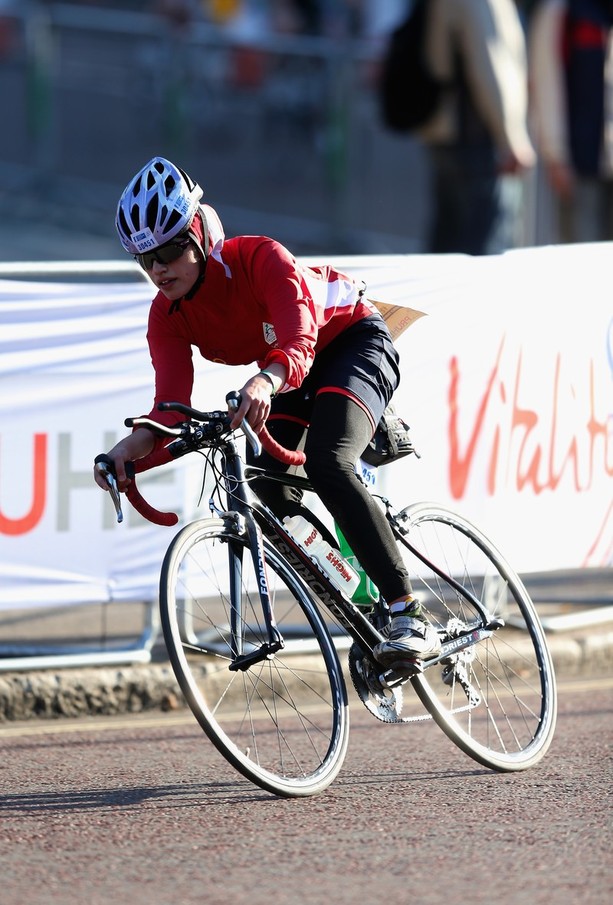
September 20-2013
A 25-year-old Iranian woman who lives in Britain scored a double first in sports Sunday—the first woman to compete in a triathlon under the Iranian flag and the first woman to compete in the sport in compliance with the Islamic dress code.
But perhaps most noteworthy was the fact that the sport’s organizers went out of their way to accommodate the demands of Iranian officials and meet the Islamic Republic’s hejab standards. More commonly, sports officials have told Iran that athletes must meet the existing standards or stay away.
Shirin Gerami joined 8,500 athletes from 83 countries taking part in the PruHealth world triathlon grand final in London, competing in full Islamic dress through a 1,500-meter swim, a 40-kilometer bike race and a 10- kilometer foot run—the three events that comprise a triathlon.
The International Triathlon Union (ITU) made arrangements so that Gerami could enter and leave the water for the swim without being seen by others. Iranian women have been barred from swim events in the past because, even if they were clothed in compliance with the dress code, their swim outfit would cling to them in a revealing way as they emerged from a pool.
The ITU also provided a tent so Gerami, alone among the participants, could change from her swimming outfit to her biking and running outfits in compete privacy.
As Gerami acknowledged, all these accommodations slowed her down. Her time was unimpressive. Of 79 women competing in her 25-29 age group, she finished 76th. Her time was 2:42:12, well behind the American winner, Calah Schlabach, with a time of 1:58:27. Seventy of the 79 women finished with times of better than 2:23, so Gerami was decidedly among the also-rans.
Gerami, who lives in Britain, wrote to the authorities at Iran’s Ministry for Sports and Youth four months ago, attempting to persuade them that Iranian women could compete in the triathlon. She traveled to Iran a few weeks ago to push her case after the Rohani Administration took office.
“When I turned up in person on their doorsteps, they realized that I am very serious, and I am willing to do anything,” she told The Guardian of London. “I was overwhelmed by how far people went in order to support me.”
Officials at Iran’s National Triathlon Federation told Gerami she could participate only days before the London event opened last Wednesday and completed the paperwork less than a day before her competition.
Gerami said her few months’ struggle had been “one of the most surreal, enriching, enlightening experiences” of her life. “I can safely say I am a different person because of it. Everything in life has its ups and downs, and I’m not claiming that it has been all easy,” she said before she competed. “The most important lesson was that I should always be sincere, always believe in my dream, and never, never give up.”
By representing Iran, Gerami said, she wanted to tell “the other story of Iran,” that positive stories about her home country do exist.
“I wanted to show that what people dismiss as impossible, is actually possible and this universal rule applies to all countries, to all people,” she said. “What kept me going was that Iran’s triathlon federation never said no. They would point out the issues, but they never shut the door on my face. They would always respond positively when I went back with a solution. For that, I am very grateful.”
Gerami’s fight for recognition by the authorities in Tehran follows the very different case of Elham Asghari, who in June swam 20 kilometers in full Islamic dress in the tidal waters of the Caspian Sea. However, the authorities denied her record-breaking nine-hour feat, saying her “un-Islamic attire” was unacceptable.
Asghari, 32, has said that despite designing a special swimsuit, which added some six kilos to her weight, Iran’s sports authorities refused to recognize her achievement. To make her frustration known, Asghari released a video online detailing how officials treated her. The authorities appeared particularly concerned about how female bodies appeared as they came out of the water.
Gerami did not complain about the dress code. “I wanted to represent Iran. If I wanted to be racing under their name, then I have to respect its values and beliefs,” she said.
The ITU said it considers gender equality as very important and supported Gerami in her triathlon journey.
Marisol Casado, the ITU president, said: “ITU is extremely happy and proud to support Shirin in her triathlon journey. She has displayed incredible courage and tenacity this week, which speaks volumes for her.”
Casado said the ITU “worked with Shirin to create specific clothing that she is both safe and comfortable in, as well as a portable changing room in the transition area where she can change into different attire for the differing triathlon disciplines.”
In the one sour note, Mohammad Ali Sabour, president of Iran’s Triathlon Federation, said he could not attend the London event because the British embassy in Ankara failed to provide him with a visa although he had filed his application two weeks in advance.